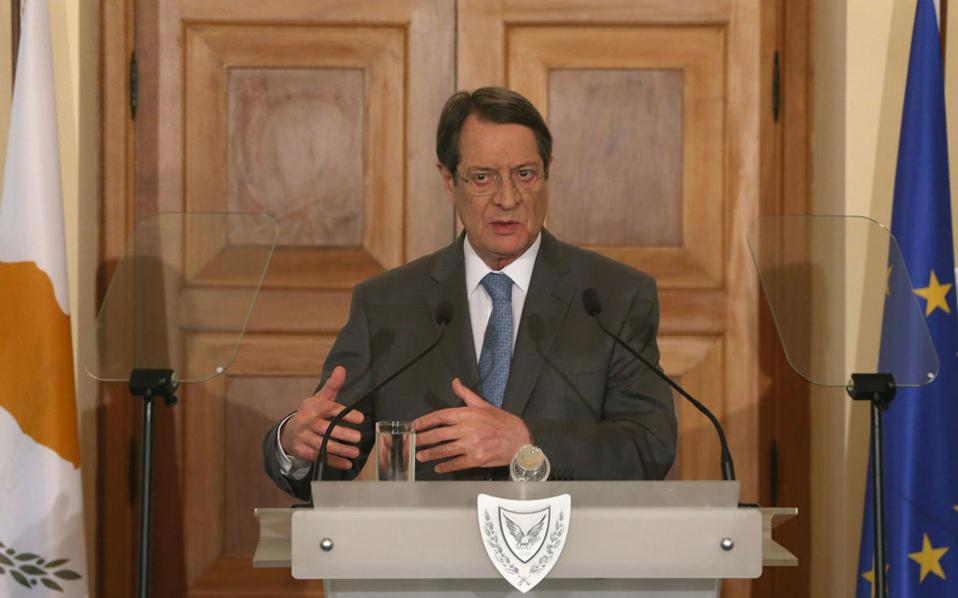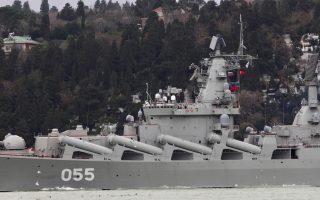The road to hell

WASHINGTON, DC – In a congressional hearing on NATO this past Tuesday, Damon Wilson, the executive vice president of the Atlantic Council, referred to NATO membership for Cyprus as a means of reunifying the country. He had earlier made a more detailed case in a piece titled “NATO Membership for Cyprus. Yes, Cyprus,” arguing that NATO membership could provide the umbrella that makes Greek and Turkish Cypriots and Greece and Turkey all feel secure enough to resolve the Cyprus problem.
In his 2018 book “The Hell of Good Intentions,” Harvard’s Stephen M. Walt unleashes an unsparing critique of America’s foreign policy establishment (including think tanks like the Atlantic Council). He takes particular aim at what President Barack Obama’s Deputy National Security Adviser Ben Rhodes once called “the Blob”: “[i]nstead of being a disciplined body of professionals constrained by a well-informed public and forced by necessity to set priorities and hold themselves accountable, today’s foreign policy elite is a dysfunctional caste of privileged insiders who are [i]nsulated both professionally and personally from the consequences of the policies they promote.”
To be sure, Walt resorts to what one reviewer called “rhetorical overkill.” Still, it was hard not to recall Walt’s scorn for “the Blob” when reading Wilson’s analysis. The idea of Cyprus in NATO does in fact have merit to it. Unfortunately, Wilson’s argument unfolds in such a flawed manner that it undermines not only his ultimate policy recommendation, but US-Cyprus bilateral relations, a just and lasting reunification of Cyprus, and even US policy in the Eastern Mediterranean.
It is said that the road to hell is paved with good intentions. For the sake of argument, we should assume good intentions on Wilson’s part. When it comes to the Eastern Mediterranean, good intentions are necessary but not sufficient. Facts count as well.
The case for the Republic of Cyprus’s eventual membership in NATO is relatively straightforward. Cyprus is a floating aircraft carrier in the Eastern Mediterranean. It houses key assets – air bases, ports, intelligence gathering facilities. War, terrorism and other threats to Western interests have reached the shores of the Eastern Mediterranean. To deny Cyprus’s value in such an environment requires geographic illiteracy.
This obvious case is not the one Wilson makes. Instead, he tries to assign a peacemaking (rather than peacekeeping) mission to NATO in Cyprus. His rationale, however, ignores critical facts and advances neither NATO’s objectives nor the reunification of Cyprus.
To fulfill its potential as a frontline Western state, Cyprus must remain truly independent. A chief obstacle to reunification is Turkey’s insistence on remaining “guarantor” of the Republic of Cyprus’s independence, territorial integrity and security. It has been 60 years since Cyprus was a colony. It is a European Union member-state and has held the presidency of the EU. The Republic of Cyprus stopped needing a “guarantor” a long time ago.
Wilson ignores this fact completely and accepts the Turkish insistence on guarantees. His proposal offers Ankara indirect guarantor rights through NATO and an avenue to legitimize its occupation presence on the island. There are several reasons for NATO to be involved in Cyprus, but mollifying Turkey’s intransigence is not among them. It was stunning to read such an argument from one of NATO’s leading proponents.
The assertion that NATO would help reunify the country is even more tenuous. Wilson does not address whether AKEL voters – who are needed to pass a referendum on reunification – would be in favor of NATO membership at this point (they wouldn’t). Wilson avoids the issue of getting Russia’s endorsement of a Cyprus solution via the United Nations Security Council, which has jurisdiction over the issue, if NATO membership is central to such a solution. Skipping discussion of these issues represents a serious sin of omission.
Wilson and the Atlantic Council have been particularly active on the Balkans, so he is naturally tempted to overlearn lessons from case studies in that region. Yet his speculation over a “knock-on effect” of the Prespes agreement for Cyprus is sheer imagination. A more instructive analysis would identify which successful tactics employed during the Prespes process might be applicable on Cyprus.
The most important lesson that Prespes teaches us is that the government of Alexis Tsipras was willing to take a risk on the Macedonia issue because of the strength of the US-Greece bilateral relationship. A visit by President Obama to Greece, an invitation to the White House by President Donald Trump, the Thessaloniki International Fair, launching a Strategic Dialogue – all of this made Prime Minister Tsipras feel as if the US had his back.
No such reassurance has ever been offered to President Nicos Anastasiades. In fact, some of Wilson’s very colleagues in the DC think-tank community have warned Republic of Cyprus officials to be wary of being pushed into a settlement and then being abandoned at the first bump in the road.
If Wilson really thinks that Prespes serves as any type of example, he should call for a rapid upgrade in the bilateral relationship through: a meeting between Presidents Trump and Anastasiades; an immediate end to the Cyprus arms embargo; and the US openly signaling its support for Cyprus’s membership in NATO’s Partnership for Peace program. At no point during Prespes did the Greeks – even the opposition – question whether the US considered them valued partners.
On the other hand, the Republic of Cyprus has to suffer the consistent indignity of being treated merely as a “community” rather than a state by segments of the American foreign policy establishment. Administration after administration has held the bilateral relationship with Cyprus hostage to reunification negotiations. Wilson should be echoing his colleague Michael Carpenter of the Penn Biden Center, who declared, “I don’t think we should give the Turks a de facto veto over our bilateral defense relationship with Cyprus.” A strong US-Cyprus bilateral relationship is what will produce a “knock-on effect,” not pointing to other diplomatic breakthroughs.
Facts matter, and Wilson’s piece gets too many wrong. Turkey invaded Cyprus twice, and didn’t even have a laughable pretext for the second invasion. Cyprus’s absence from the Partnership for Peace program is not “due entirely to the outstanding reunification problem,” but to Turkey’s blocking it. Nicos Anastasiades is the president of the Republic of Cyprus – which the US has declared a “strategic partner” – not merely the “Greek-Cypriot president.” And Makarios was the archbishop of Cyprus, not the patriarch. Getting such facts wrong undermines the credibility of American analysts in Cyprus and Greece and their ability to contribute to policymaking there.
Damon Wilson and the Atlantic Council – and all of those in Foggy Bottom and abroad that are advocating for them to do more on the Eastern Mediterranean – may indeed have good intentions when it comes to Cyprus. But the eagerness to whitewash Turkey’s actions, mollify Recep Tayyip Erdogan’s demands and avoid important details could take Washington, Nicosia and Athens down the road to hell.
Endy Zemenides is executive director of the Hellenic American Leadership Council.





